Search titles
Displaying results 61 to 70 of 152.

East Asia Forum Quarterly: Volume 8, Number 4, 2016 »
Publication date: November 2016
East Asia Forum Quarterly grew out of East Asia Forum (EAF) online, which has developed a reputation for providing a platform for the best in Asian analysis, research and policy comment on the Asia Pacific region in world affairs. EAFQ aims to provide a further window onto research in the leading research institutes in Asia and to provide expert comment on current developments within the region. The East Asia Forum Quarterly, like East Asia Forum online, is an initiative of the East Asia Forum (EAF) and its host organisation, the East Asian Bureau of Economic Research (EABER) in the Crawford School of Economics and Government in the College of Asia & the Pacific at The Australian National University.
Download for free
Not available for purchase

Deep Crustal Seismic Reflection Profiling »
Australia 1978–2015
Authored by: Brian Kennett, E. Saygin, T. Fomin, Richard Blewett
Publication date: November 2016
Deep Crustal Seismic Reflection Profiling: Australia 1978–2015 presents the full suite of reflection profiles penetrating the whole crust carried in Australia by Geoscience Australia and various partners.
The set of reflection data comprises over 16,000 km of coverage across the whole continent, and provides an insight into the variations in crustal architecture in the varied geological domains. Each reflection profile is presented at approximately true scale with up to 220 km of profile per page and overlap between pages. Each reflection section is accompanied by a geological strip map showing the configuration of the line superimposed on 1:1M geology. The compilation includes a suite of large-scale reflection transects groups of 1,000 km or more that link across major geological provinces, and an extensive bibliography of reports and relevant publications.

The Lion that Didn't Roar »
Can the Kimberley Process Stop the Blood Diamonds Trade?
Authored by: Nigel Davidson
Publication date: October 2016
In 2017 it will be Australia’s turn to chair the Kimberley Process Certification Scheme (KP), an international organisation set up to regulate the trade in diamonds. Diamonds are a symbol of love, purchased to celebrate marriage, and it is therefore deeply ironic that the diamond trade has become linked with warfare and human rights violations committed in African producer countries such as Sierra Leone, the Democratic Republic of Congo and, more recently, Zimbabwe and Angola. In their quest for diamonds, or by using diamonds to purchase weapons, armed groups in these countries have engaged in recruiting child soldiers, amputating limbs, and committing rape and murder. In response to the problem, the international community, non-governmental organisations and key industry players such as De Beers combined forces to create the Kimberley Process in 2002. The KP uses an export certificate system to distinguish the legitimate rough diamond trade from so-called ‘blood diamonds’, which are also known as ‘conflict diamonds’. This book considers the extent to which the KP, supported by other agencies at the international and national levels, has been effective in achieving its mandate. In so doing, it presents an original model derived from the domain of regulatory theory, the Dual Networked Pyramid, as a means of describing the operation of the system and suggesting possible improvements that might be made to it.
Nigel Davidson spoke with 936 ABC Hobart about what Australia can do to help stop blood diamonds. Listen to the full interview here.
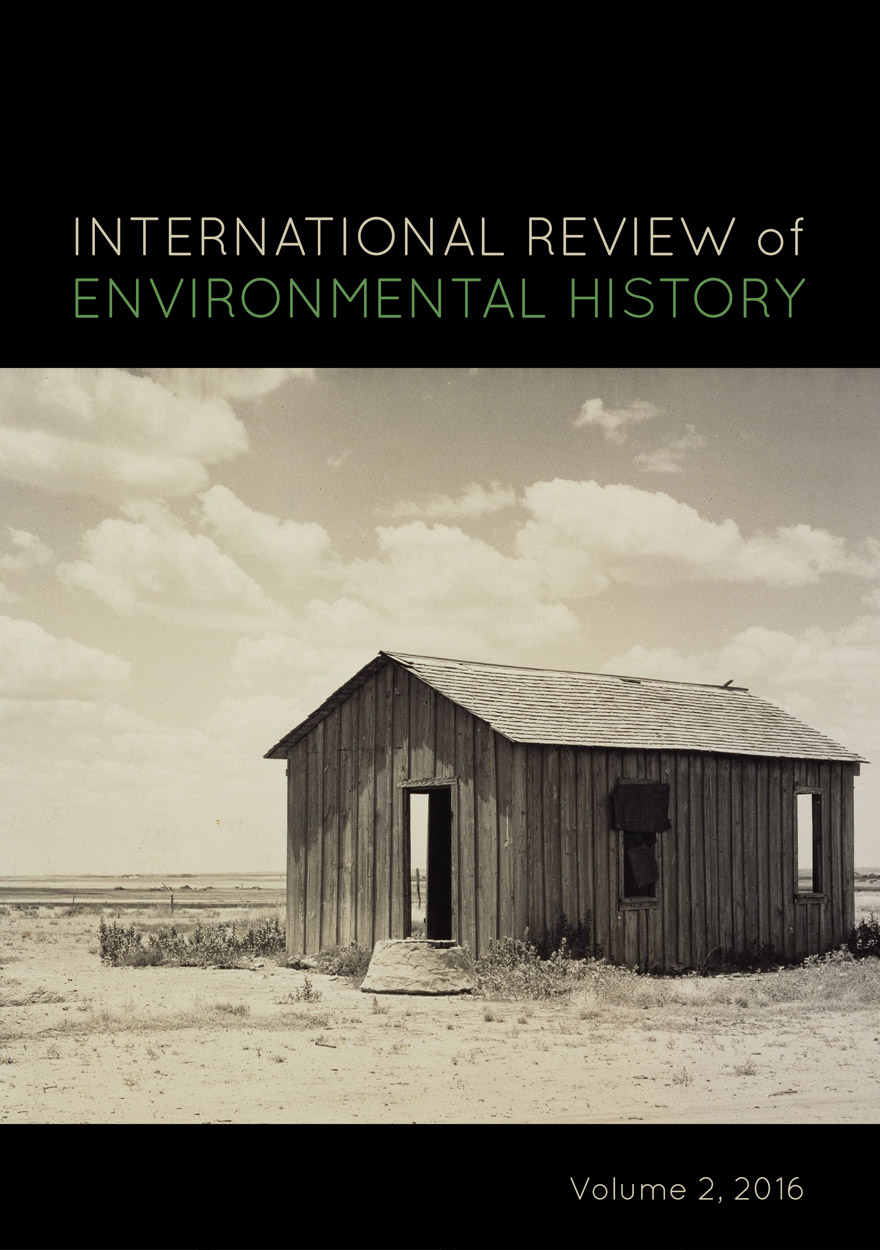
International Review of Environmental History: Volume 2, 2016 »
Edited by: James Beattie
Publication date: September 2016
International Review of Environmental History takes an interdisciplinary and global approach to environmental history. It encourages scholars to think big and to tackle the challenges of writing environmental histories across different methodologies, nations, and time-scales. The journal embraces interdisciplinary, comparative and transnational methods, while still recognising the importance of locality in understanding these global processes.
The journal’s goal is to be read across disciplines, not just within history. It publishes on all thematic and geographic topics of environmental history, but especially encourage articles with perspectives focused on or developed from the southern hemisphere and the ‘global south’.
Download for free
Not available for purchase

The Bionarrative »
The story of life and hope for the future
Authored by: Stephen Boyden
Publication date: August 2016
This book is for the general reader interested in the human place in nature and the future of civilisation. It is based on the biohistorical approach to the study of human situations. This approach recognises human culture as a new and extremely important force in the biosphere.
The book discusses the evolution of life and the essential ecological processes on which all life, including human civilisation, depend. It describes the conditions of life and ecology of humans in the four ecological phases in human history, with emphasis on the impacts of human culture on biological systems.
It explains how, as cultures evolved, they often came to embrace not only factual information of good practical value, but also assumptions that are sheer nonsense, sometimes leading to activities that caused unnecessary human distress or damage to local ecosystems. These are examples of cultural maladaptation. There have been countless instances of cultural maladaptation in human history.
The days of the fourth ecological phase of human history, the Exponential Phase, are numbered. Cultural maladaptations are now on a massive scale, and business as usual will inevitably lead to the ecological collapse of civilisation.
The only hope for the survival of civilisation lies in radical changes in the worldviews and priorities of the prevailing cultures of the world, leading to a fifth ecological phase — a phase in which human society is truly sensitive to, in tune with and respectful of the processes of life. This is called a biosensitive society. The book concludes with discussion on the essential characteristics of a biosensitive society and on the means by which the necessary cultural transformation might come about.
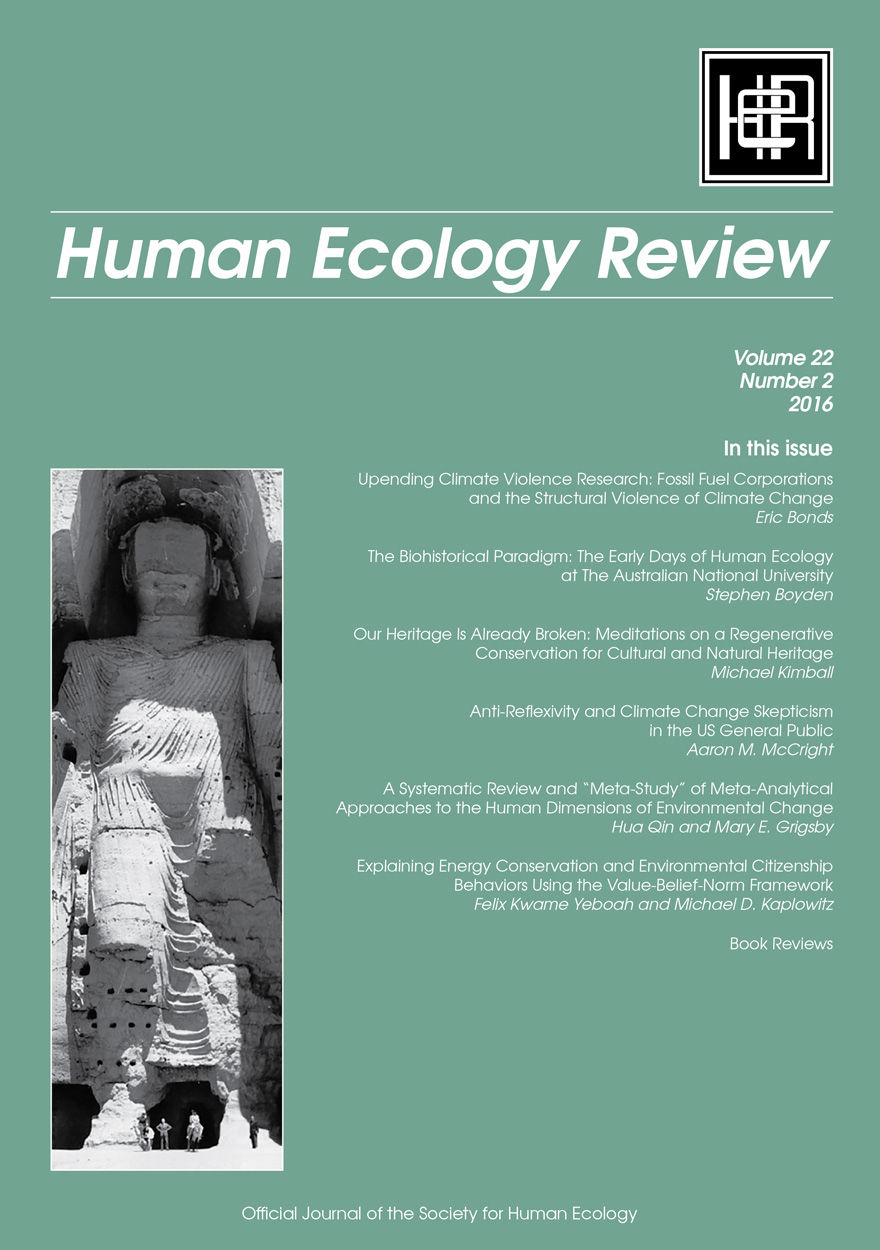
Human Ecology Review: Volume 22, Number 2 »
Publication date: July 2016
Human Ecology Review is a semi-annual journal that publishes peer-reviewed interdisciplinary research on all aspects of human–environment interactions (Research in Human Ecology). The journal also publishes essays, discussion papers, dialogue, and commentary on special topics relevant to human ecology (Human Ecology Forum), book reviews (Contemporary Human Ecology), and letters, announcements, and other items of interest (Human Ecology Bulletin). Human Ecology Review also publishes an occasional paper series in the Philosophy of Human Ecology and Social–Environmental Sustainability.
Download for free
Not available for purchase

Geography, Power, Strategy and Defence Policy »
Essays in Honour of Paul Dibb
Edited by: Desmond Ball, Sheryn Lee
Publication date: May 2016
Paul Dibb AM has had an extraordinary career. He enjoys an international scholarly reputation of the highest order, while at the same time he has done much distinguished public service. He was a pioneer in moving back and forth between posts in government departments, notably the Department of Defence, and academia. He began as a student of Soviet economic geography, and then spent nearly two decades in Australian Defence intelligence, including service as Head of the National Assessments Staff (NAS) in the Joint Intelligence Organisation (JIO) from 1974 to 1978, Deputy Director of JIO in 1978–80, Director of JIO in 1986–88, and Deputy Secretary of Defence (Strategy and Intelligence) in 1988–91, before becoming a Professor in the Strategic and Defence Studies Centre (SDSC) at The Australian National University (where he is now an Emeritus Professor). He has been quite happy to engage in vigorous public debate about important and controversial strategic and defence issues, giving him a high public profile.
The contributors include two former Chancellors of ANU, one a former Minister of Defence, and the other a former Secretary of the Department of Defence, a former Chief of the Defence Force (CDF), and other former senior officials, as well as academic specialists in geography, international relations, and strategic and defence studies.
‘This would be a high-quality set of essays for any edited volume, but for a festschrift – a genre that sometimes generates uneven collections – this is an exceptional assembly. The individual pieces are very good; together, they have coherence and power.’
– Professor Ian Hall, Professor of International Relations, Griffith University
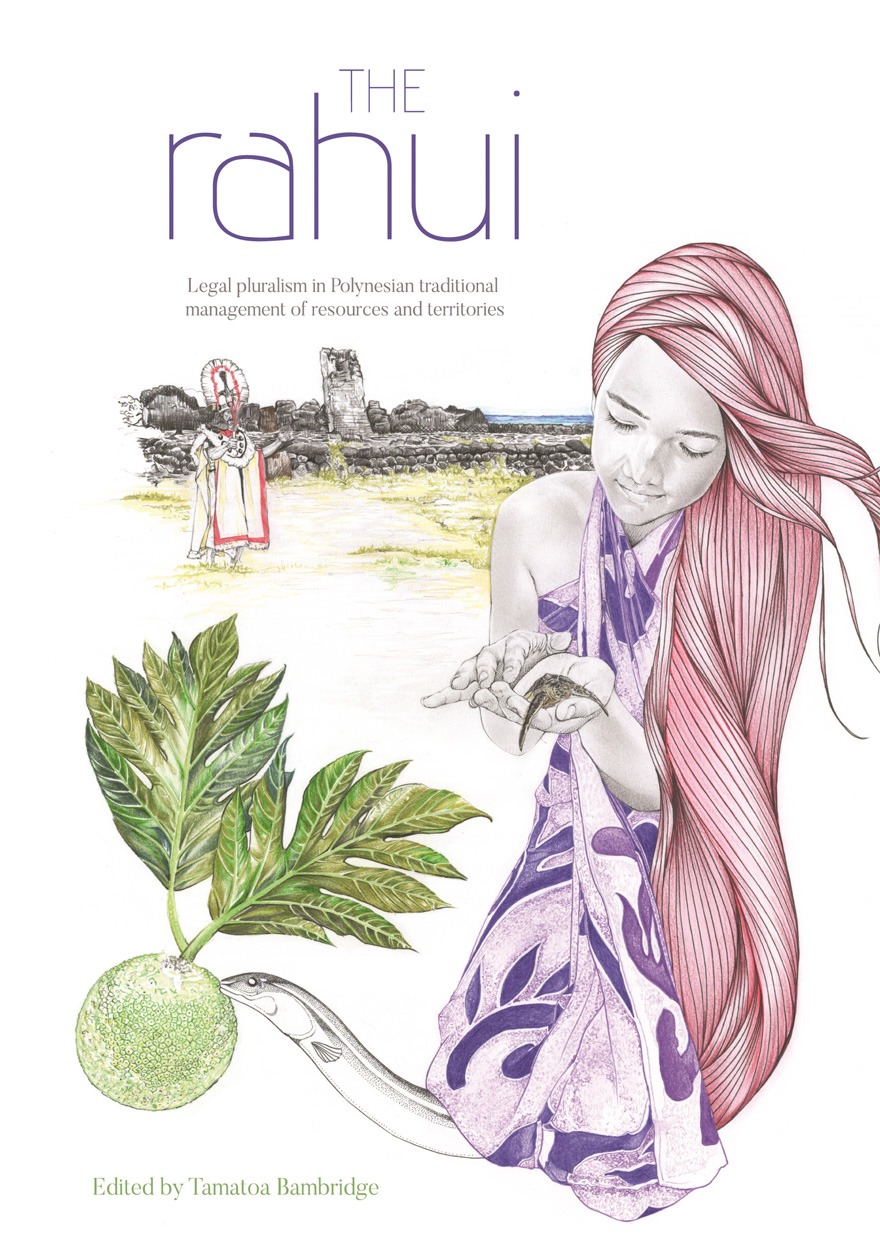
The Rahui »
Legal pluralism in Polynesian traditional management of resources and territories
Edited by: Tamatoa Bambridge
Publication date: March 2016
This collection deals with an ancient institution in Eastern Polynesia called the rahui, a form of restricting access to resources and/or territories.
While tapu had been extensively discussed in the scientific literature on Oceanian anthropology, the rahui is quite absent from secondary modern literature. This situation is all the more problematic because individual actors, societies, and states in the Pacific are readapting such concepts to their current needs, such as environment regulation or cultural legitimacy. This book assembles a comprehensive collection of current works on the rahui from a legal pluralism perspective. This study as a whole underlines the new assertion of identity that has flowed from the cultural dimension of the rahui. Today, rahui have become a means for indigenous communities to be fully recognised on a political level. Some indigenous communities choose to restore the rahui in order to preserve political control of their territory or, in some cases, to get it back. For the state, better control of the rahui represents a way of asserting its legitimacy and its sovereignty, in the face of this reassertion by indigenous communities.
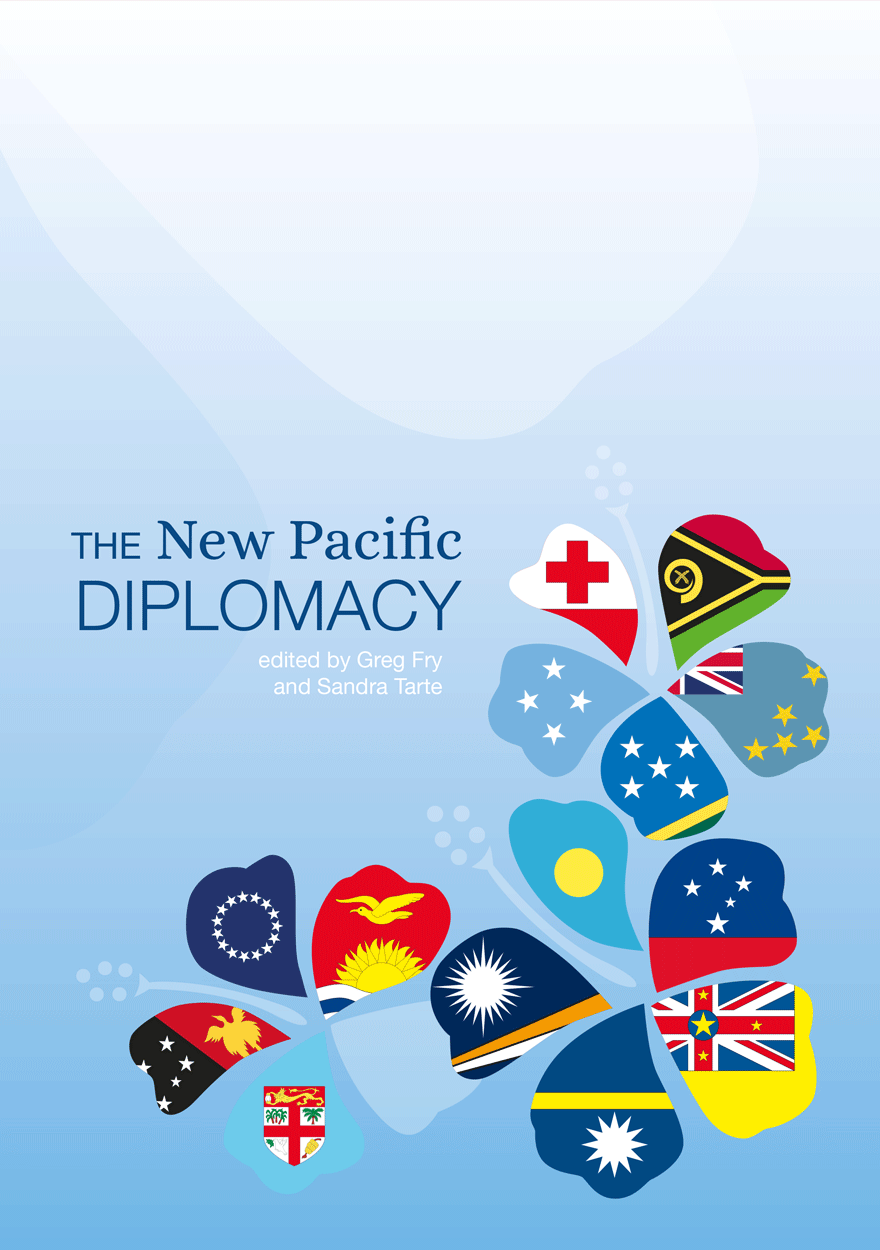
The New Pacific Diplomacy »
Edited by: Greg Fry, Sandra Tarte
Publication date: December 2015
Since 2009 there has been a fundamental shift in the way that the Pacific Island states engage with regional and world politics. The region has experienced, what Kiribati President Anote Tong has aptly called, a ‘paradigm shift’ in ideas about how Pacific diplomacy should be organised, and on what principles it should operate. Many leaders have called for a heightened Pacific voice in global affairs and a new commitment to establishing Pacific Island control of this diplomatic process. This change in thinking has been expressed in the establishment of new channels and arenas for Pacific diplomacy at the regional and global levels and new ways of connecting the two levels through active use of intermediate diplomatic associations.
The New Pacific Diplomacy brings together a range of analyses and perspectives on these dramatic new developments in Pacific diplomacy at sub-regional, regional and global levels, and in the key sectors of global negotiation for Pacific states – fisheries, climate change, decolonisation, and trade.
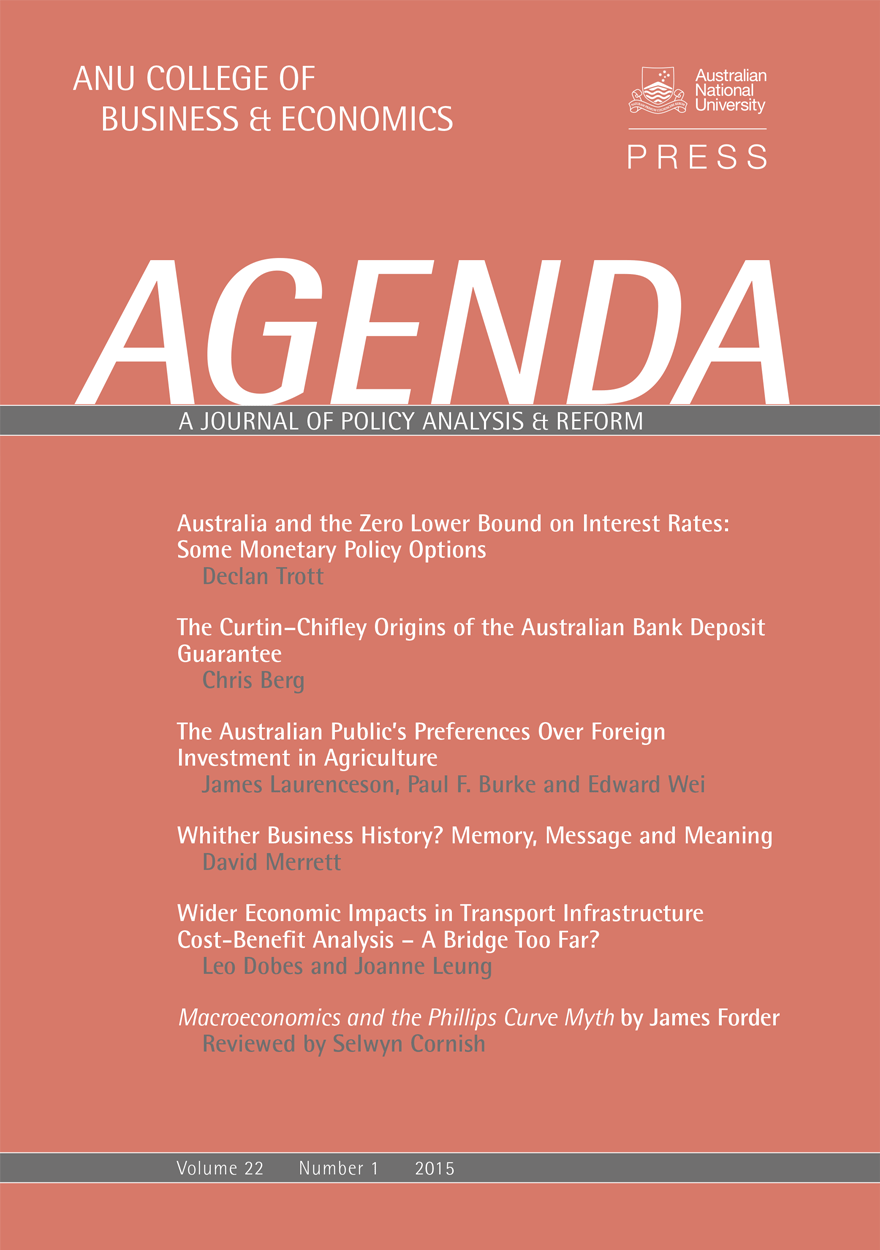
Agenda - A Journal of Policy Analysis and Reform: Volume 22, Number 1, 2015 »
Edited by: William Coleman
Publication date: December 2015
Agenda is a refereed, ECONLIT-indexed and RePEc-listed journal of the College of Business and Economics, The Australian National University. Launched in 1994, Agenda provides a forum for debate on public policy, mainly (but not exclusively) in Australia and New Zealand. It deals largely with economic issues but gives space to social and legal policy and also to the moral and philosophical foundations and implications of policy.
Subscribe to the Agenda Alerting service if you wish to be advised on forthcoming or new issues.
Download for free
Not available for purchase



